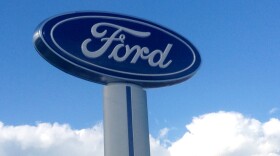Just as it did in the 20th century, Michigan is leading a transportation revolution in the 21st.
At the former Willow Run bomber plant near Ypsilanti, the new American Center for Mobility is emerging as one of the world’s premiere test sites for self-driving cars. The center is working with Michigan State University and other institutions across the state to train the next generation of autonomous vehicle engineers.
MSU has been tinkering with self-driving vehicles for a couple years...but now, it’s shifting into a new gear. In October, the university joined the Academic Consortium, a partnership between the American Center for Mobility and 15 Michigan colleges and universities. The goal is to develop classroom training and work study opportunities for those who will build the next generation of hi-tech cars.
“It’s a huge investment and it’s a huge plus for the state of Michigan,” says MSU engineering professor Dr. Haydar Radha. He’s the director of CANVAS: Connected and Autonomous Networked Vehicles for Active Safety.
His team is participating in the Auto Challenge, a project by General Motors and the Society of Automotive Engineers. It’s a three-year program in which students build a fully autonomous driving system. In 2017, MSU was one of just eight universities selected across North America.
Computer engineering senior Kyle Lammers slides behind the wheel of a white Chevy Bolt EV, his laptop at the ready.
“As I push a key on the keyboard, you can see the steering wheel and tire move,” Lammers explains. “We can bring it back the other way and center it up. So this was a big milestone we hit this week, of actually being able to communicate with the car. It’s a big first step.”
The Chevy, if you will, is training wheels. The main attraction sits a few feet away, tricked out in varying hues of green and white Spartan regalia. This Ford MKZ is the heart of the CANVAS program.
Grad student Daniel Kent shows me its brain. It’s in the trunk.
“Right now we actually have three separate computers in here,” says Kent. “We’re actually working to integrate a fourth. We have too much equipment because you never know when you might need something.”
We head out onto the street, but the ride is not as sci-fi as you might imagine. The car is being driven by a real human being, Daniel. Dr. Radha joins us, and so does grad student Su Pang. He’s in the back seat watching a computer screen.
We’re testing the vehicle’s LIDAR system. LIDAR means light detection and ranging. Laser sensors paint a black and white 3D picture of the car and its surroundings. Su Pang says it’s called “localization.”
"This is our car, and this is the buildings, the trees, the roads." Pang explains. "You see, the GPS signal sometimes will be blocked and it will drift a little. So, it's not very accurate. So, using this method we can achieve centimeter-level localization accuracy."
The automation is impressive. But I can’t help but wonder: will free spirited, born to be wild, wind in their hair Americans ever willingly let go of the wheel and hand the driving over to a computer?
CANVAS director Haydar Radha gets it.
“An excellent point,” Radha acknowledges. “I personally believe that any person that purchases an autonomous vehicle in the future should have the option of driving it also manually. Because even those people who have a lot of passion for doing their own driving, there will be situations where they wish that they had autonomous capability...at least as an option.”
And that’s only part of the debate that’s buzzing over autonomous vehicles. As the industry grows, so will the questions. Will self-driving cars affect insurance rates? Will they take jobs away from cabbies and truckers? And – in an emergency – can a computer make a life or death decision?
So it seems the autonomy industry needs more than engineers. There’s bound to be lawyers and even philosophers involved.
And that’s where Michigan State University believes it has the know-how to navigate the road ahead.










